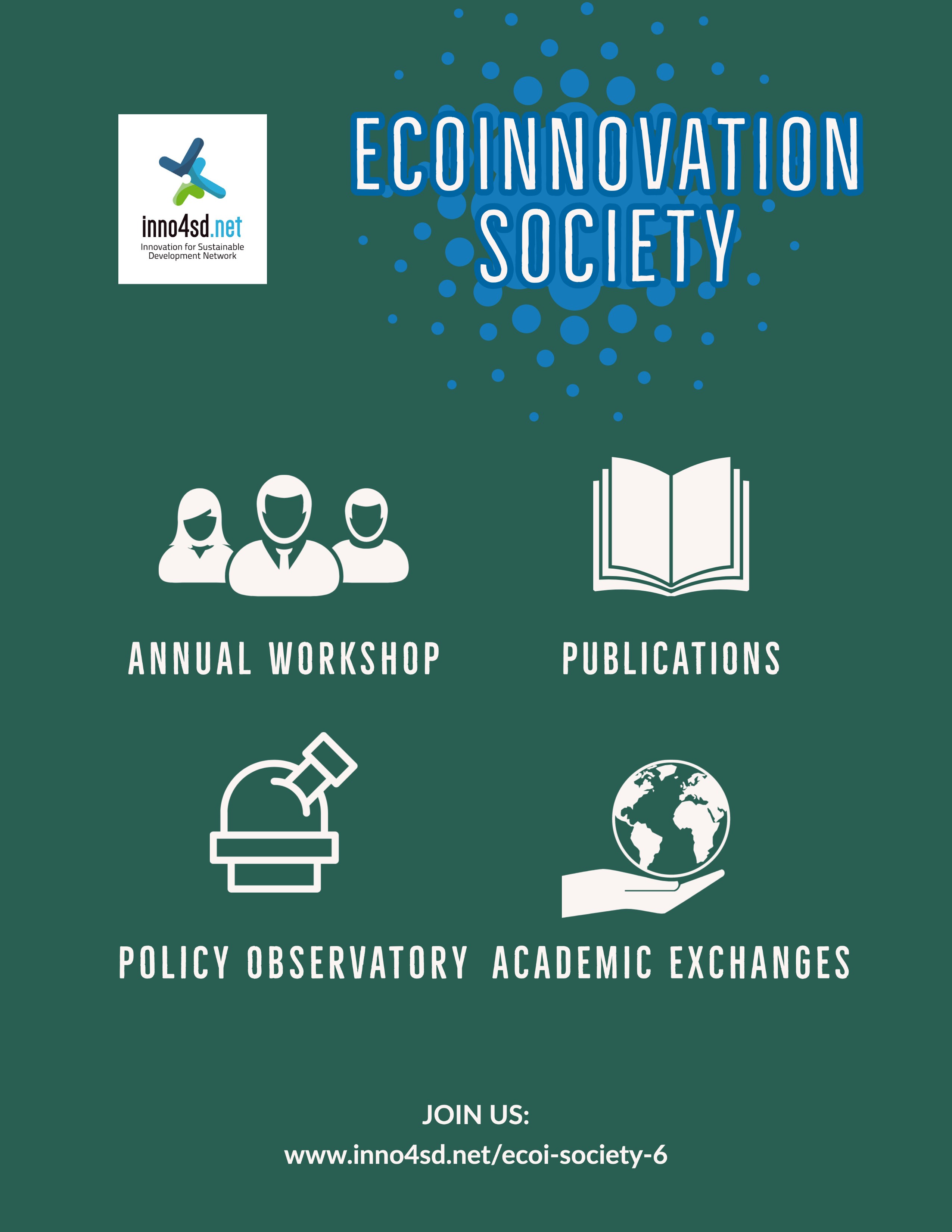Eco-innovation Society
Bringing together scholars interested in innovation for global sustainability and climate action.
Did you know that more than 4,000 scholars and practitioners from 47 countries have produced scientific publications explicitly focusing on eco-innovation? Coincidentally, they are located in countries that contribute to 70% of global GHG emissions (Turkeli, et al 2019).
Are you one of them? This society is for you!
What is eco-innovation?
Eco-innovations are novel solutions that bring positive benefits to the environment and society at large (c.f. Carrillo Hermosilla, et. al. 2010; Ekins, 2010, Kemp, 2010). Although its origins can be traced to the seminal paper of Rennings (2000) and the book of Fussler and James (1996), eco-innovation still is considered a novel field of research and scholarly work.
In general terms, eco-innovations are environmentally better than existing alternatives, and are supported by a business case rationale (UNEP, 2014). They have received public support as they constitute solutions to tackle climate, biodiversity and sustainability challenges (Ekins, 2010). to date, UN Environment, the OECD, the European Commission, the Inter-American Development Bank, the Association of Southeast Asian Nations (ASEAN), have all created programmes to support policy and business action for eco-innovation. From a policy perspective, supporting eco-innovation has a positive effect to enable a circular, green and just economy, and it can help governments in achieving their Sustainable Development and Climate Action agendas (Konnola, et al 2023).
However, this type of innovation can also create undesired and 'rebound effects' in the economy, environment and/or society (c.f. Mazzanti and Zoboli, 2006). Meaning, not all innovations can be considered truly green and socially inclusive (McDowall et al. 2011). As such, there is a pressing need to continue doing research and education to better support the market entry of those eco-innovations that can help the economy to align with planetary boundaries.
In scholarly terms, most of the eco-innovation research has been published in a large number of Journals. The Journal of Cleaner Production, Sustainability, Business Strategy and the Environment, Ecological Economics, and Environmental Innovation and Societal Transitions have insofar published most of the academic work in this topic. Eco-innovation is a term commonly used as a synonym to environmental innovation, green innovation, ecological innovation, sustainable innovation, climate innovation, among other terms - which has created some confusion and fragmentation across different epistemic communities.
To date, there is a growing number of educational programmes, research projects and science-policy initiatives with a focus on eco-innovation (see our global map here: https://www.inno4sd.net/global...). This creates an exciting opportunity to consolidate a community of thinkers and doers.
Why a society for the study of eco-innovation?
The Eco-innovation Society responds to the need to create a forum and platform for the academic, scientific and practitioner community specialised in this topic. Today, it already brings together more than 60 scholars, academics, working on different aspects of eco-innovation, particularly from economics and business management.
Eco-innovation is an area of scholarly, research and practice focusing on the development, transfer, diffusion and adoption of innovations that contribute to environmental sustainability. It is our view that there is a need to continue making progress around theory, methods, applicability, transferability and education around the topic of eco-innovation.

To respond to the opportunity to bring together the eco-innovation community, on November 12th, 2021 the society was officially announced at the 10th International Workshop on Advances in Cleaner Production (IWACP).
After months of preparations led by a small core team led by professors Massimiliano Mazzanti, Roberto Zoboli and Fernando J. Diaz Lopez, the Steering Board of the Eco-innovation Society was was finally announced in October, 2022. This special group is formed by 22 leading scholars in the field and has the responsibility to oversee the development and growth of this new society (see https://www.inno4sd.net/eco-in...).
The same year, the first workshop of the society was also organised in Ferrara, Italy (November 10-11, 2022). Under the theme "More than 20 years of Eco-innovation research: lessons learnt and new directions”, this historical event was hosted by the University of Ferrara and the SEEDS Inter-University Research Centre and supported by the Transitions Hub of EIT Climate KIC and the Advances of Cleaner Production Network. This event was also part of the IAERE 10 Tour, for the tenth anniversary of the Italian Association of Environmental and Natural Resources Economists - www.iaere.org (see here for more information: https://www.inno4sd.net/save-t...)
In 2024 the S&O Climate and Earth Centre of HEC Paris (Sustainability and Organizations Institute) invites all interested scholars to the second workshop under the theme: "Eco-innovation for decarbonization and circularity: aligning business and policy with planetary boundaries". The event will be hosted at the HEC Paris campus (France), on November 28-29, 2024. More information: https://www.inno4sd.net/eco-in..
The society is now working in the creation of a dedicated website .Information about the mission, research agenda, activities, how to become a member, publication outlets and events will be available in this new web space.
Would you like to connect with us?
If you are interested in connecting with the society, do not miss the opportunity to attend our next event. For now, you can already join our mailing list.
The Steering group is striving to achieve a balance in terms of gender and seniority. For this reason, there is an open process to nominate additional members for the board - particularly women and early career professionals.
For more information and to express your interest in participating in this initiative you may contact: ecoinnovation [at] inno4sd.net